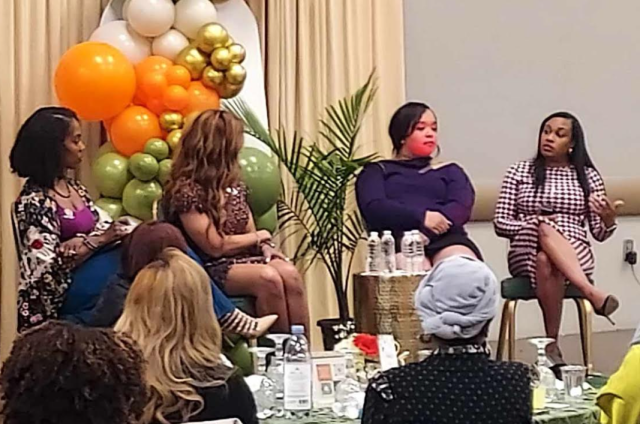Hope, Support and Mental Health Wellness for Black Women in Birmingham

[ad_1]

By Keisa Sharpe-Jefferson | For The Birmingham Times
April Simpkins’s life was forever changed when her daughter, Cheslie Kryst, a model, lawyer and television personality and Miss USA (2019) was lost to suicide three years ago.

Kryst, who according to her mother “was an incredibly humble woman who loved to give back to the community.”
Simpkins said news of Cheslie’s death sent her family into a tailspin and she lost her appetite as a trauma response, even though she is very health conscious. (Simpkins is preparing to run the New York marathon this year for a third time).
Simpkins also consistently worked with a counselor to cope with the trauma as she “just settled Cheslie’s estate in December.”
On Friday, Simpkins was part of a panel moderated by Dr. Nadia Richardson, founder of Black Women’s Mental Health Institute (BWMHI), during its second annual luncheon at the Birmingham Botanical Gardens sponsored by the Birmingham Association of Realtors.
The panel also included Meesha Emmett of the American Foundation for Suicide Prevention (Alabama Chapter), and Tiffany Storey, Founder of Storeyhouse Counseling and Consulting.
Attendees listened as the panelists discussed holistic mental health wellness from root causes, to glaring symptoms, and even practical treatment options to save lives.
Simpkins said her daughter didn’t advocate for herself but “would redirect everything back to that person (who asked how she was doing) so she did not have to talk about herself and how she was feeling,” said Simpkins.
But her mother, a chief human resources officer for a national organization, said her daughter was in a fight.
In addition to being a beauty pageant titleholder, Kryst was also an attorney and a correspondent for the TV show Extra from October 2019 until her death.
“Cheslie battled persistent depressive disorder. She had low-grade depression all the time,” said Simpkins.
“It’s not to say that she wasn’t happy (at times), but her job (in television) did not give her permission to show up as her authentic self at times she may have needed to,” said Simpkins.
Simpkins will publish her daughter’s book, “By the Time You Read This” next month. Kryst was set to publish it before her suicide.
As the resident clinician on the panel, Storey shared that individuals who are high-functioning and high-achieving need “to make sure they have a good support system in place.”
“When you’re close in a relationship with someone who is highly successful, listening closely to what they say, checking in on them regularly, and being aware of their patterns is important, said Storey.”
Storey said everyone doesn’t show up in typical ways.
She shared her own story of the difficulty in navigating her dad’s death because she wasn’t initially sure how to process her own emotions.
Richardson, who has a background as a University of Alabama at Birmingham instructor, mental health advocate and leadership coach, said she advocates from a personal perspective.
Not only is she well versed in the data, but Richardson also said she manages a mental health challenge in the form of “high functioning, rapid cycling, bipolar two,” which is characterized as experiencing four or more episodes of mania or depression in a year’s timeframe.
“Part of the challenge for individuals who are successful is to express to the people who admire them or celebrate them, that I’m not quite okay,” she said.
Emmett, with the American Foundation for Suicide Prevention, said the challenge with our community is that, as Black women, “everyone expects us to do everything and to the point that everyone has made, we don’t know how to ask for help.”
In January, her organization launched ‘Let’s Save Lives: An Introduction to Suicide in the African American Community.’
And although Emmett said it’s a good start, “we have to take a more holistic approach in our community,” she said.
Other guests at the luncheon included Birmingham’s first Poet Laureate Salaam Green, who’s also the founder of Literary Healing Arts.
Green said she too has suffered from depression and Generalized Anxiety Disorder, and the information and support resonated deep within her.
“[BWMHI] supports women and breaking barriers. We have suffered silently for too long,” said Green.
Green said her biggest takeaway from the luncheon was the reassurance “for high-achieving Black women to understand the importance of self-advocacy; to be confident that they can take off their superhero capes from time to time; and to know that there is a safe space for them to get help.”
Richardson said next year’s annual event will focus on more solutions to mental health challenges with African American women. She announced that free counseling services are available through the organization thanks to a $300,000 grant from Birmingham City Councilor Crystal Smitherman.
For more on Black Women’s Mental Health Institute visit BWMHI.
[ad_2]
Source link
